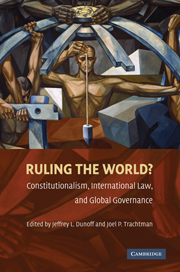Book contents
- Frontmatter
- Contents
- Contributors
- Preface: International Institutions: Why Constitutionalize?
- Acknowledgments
- PART I WHAT IS CONSTITUTIONALIZATION BEYOND THE STATE?
- PART II THE CONSTITUTIONAL DIMENSIONS OF SPECIFIC INTERNATIONAL REGIMES
- PART III CROSSCUTTING ISSUES
- 9 Human Rights and International Constitutionalism
- 10 The Cosmopolitan Turn in Constitutionalism: On the Relationship between Constitutionalism in and beyond the State
- 11 Constitutional Heterarchy: The Centrality of Conflict in the European Union and the United States
- 12 Courts and Pluralism: Essay on a Theory of Judicial Adjudication in the Context of Legal and Constitutional Pluralism
- 13 Whose Constitution(s)? International Law, Constitutionalism, and Democracy
- Index
- References
12 - Courts and Pluralism: Essay on a Theory of Judicial Adjudication in the Context of Legal and Constitutional Pluralism
Published online by Cambridge University Press: 05 June 2012
- Frontmatter
- Contents
- Contributors
- Preface: International Institutions: Why Constitutionalize?
- Acknowledgments
- PART I WHAT IS CONSTITUTIONALIZATION BEYOND THE STATE?
- PART II THE CONSTITUTIONAL DIMENSIONS OF SPECIFIC INTERNATIONAL REGIMES
- PART III CROSSCUTTING ISSUES
- 9 Human Rights and International Constitutionalism
- 10 The Cosmopolitan Turn in Constitutionalism: On the Relationship between Constitutionalism in and beyond the State
- 11 Constitutional Heterarchy: The Centrality of Conflict in the European Union and the United States
- 12 Courts and Pluralism: Essay on a Theory of Judicial Adjudication in the Context of Legal and Constitutional Pluralism
- 13 Whose Constitution(s)? International Law, Constitutionalism, and Democracy
- Index
- References
Summary
There is an emerging body of literature that describes a context of constitutional and legal pluralism. Usually constitutional pluralism identifies the phenomenon of a plurality of constitutional sources of authority that create a context for potential constitutional conflicts between different constitutional orders to be solved in a nonhierarchical manner. More broadly, legal pluralism can be used, in this context, to refer both to the multiplication of competing legal sites and jurisdictional orders and to the expansion of relevant legal sources. Such context affects the role of courts and the character of judicial adjudication and interpretation. This chapter aims to review the impact of pluralism in models of interpretation used by courts and in the institutional dimension of judicial adjudication.
I will undertake this analysis by reference to a broad notion of constitutional and legal pluralism that encompasses different dimensions. In this respect, it is necessary to distinguish between internal and external forms of pluralism. Internal pluralism refers to a pluralism that is internal to a particular legal order. In other words, it refers to a legal order where multiple sites of power coexist, are mutually recognized, and may not always be organized in a nonhierarchical relationship. The best-known example of such a legal order is the European Union. We can identify four main sources of internal pluralism in the European Union. First, there is a plurality of constitutional sources (both European and national) that have fed the EU constitutional law and, in particular, its general principles of law.
- Type
- Chapter
- Information
- Ruling the World?Constitutionalism, International Law, and Global Governance, pp. 356 - 380Publisher: Cambridge University PressPrint publication year: 2009
References
- 33
- Cited by



